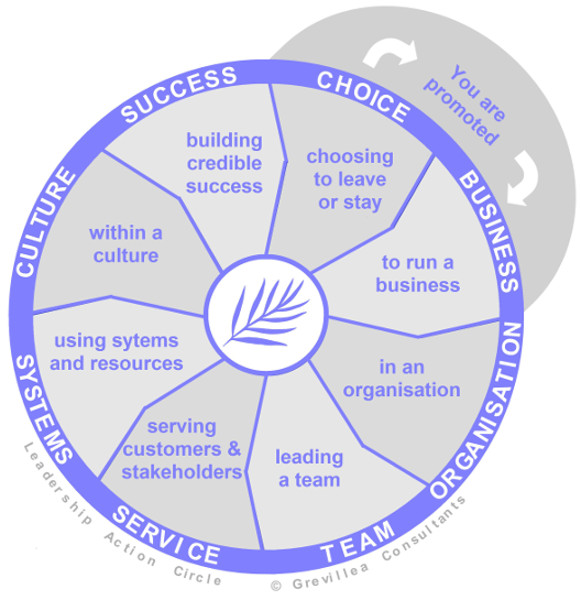Transition, career and organisational needs
Action
There are unpleasant moments during role transition. Sometimes they can be demoralising. Always look for strategies to work through issues so you can remain in the role. If you leave you begin the transition experience again in the next role, which resets the sequence of phases, including the unpleasant bits.
Risks/Opportunities/Surprises
Sometimes you do land in the wrong role or organisation. You may even see some of the indicators of a failing transition, such as a poor relationship with your boss. If you engage in a thorough analysis of your situation, consult your support network to ensure you are not operating out of stress or disappointment, you may consider changing roles. There is no point damaging your health or reputation if the issues causing you trouble appear to be entrenched and unresolvable.
There are unpleasant moments during role transition. Sometimes they can be demoralising. Always look for strategies to work through issues so you can remain in the role. If you leave you begin the transition experience again in the next role, which resets the sequence of phases, including the unpleasant bits.
Risks/Opportunities/Surprises
Sometimes you do land in the wrong role or organisation. You may even see some of the indicators of a failing transition, such as a poor relationship with your boss. If you engage in a thorough analysis of your situation, consult your support network to ensure you are not operating out of stress or disappointment, you may consider changing roles. There is no point damaging your health or reputation if the issues causing you trouble appear to be entrenched and unresolvable.
Action
Be careful about changing roles too frequently. This can damage your C.V. and future prospects. As the data shows, it usually takes 18 to 24 months to implement your biggest changes and start to demonstrate your greatest value and achievements in the role. Short job stints prevent you from doing this and raise questions about your loyalty or reliability.
Risks/Opportunities/Surprises
Authors and recruitment professionals are divided about the effect of rapid job turnover. In some technical professions it can indicate wide experience, in others it suggests not taking responsibility to go the distance and get substantial results. Given the significant costs in recruiting someone, a prospective employer may balk at recruiting someone whose work history suggest they may leave in a matter of months. Given that leaders are meant to strengthen the performance of an organisation, demonstrating durability and results is important.
Be careful about changing roles too frequently. This can damage your C.V. and future prospects. As the data shows, it usually takes 18 to 24 months to implement your biggest changes and start to demonstrate your greatest value and achievements in the role. Short job stints prevent you from doing this and raise questions about your loyalty or reliability.
Risks/Opportunities/Surprises
Authors and recruitment professionals are divided about the effect of rapid job turnover. In some technical professions it can indicate wide experience, in others it suggests not taking responsibility to go the distance and get substantial results. Given the significant costs in recruiting someone, a prospective employer may balk at recruiting someone whose work history suggest they may leave in a matter of months. Given that leaders are meant to strengthen the performance of an organisation, demonstrating durability and results is important.
Action
Assess your career ambitions carefully. There are simply not enough CEO positions for every leader to become one. Most leaders will spend their careers at a manager or executive level. Knowing when you've found your niche is important so you can commit to the role and its corresponding career benefits. This does not mean you won't ever change roles or organisations but it does mean you are focused on a much longer time frame than someone looking for promotion.
Risks/Opportunities/Surprises
Choosing your niche is different to ending up in a rut. Committing to a role, function or organisation requires an ongoing dedication to getting results and avoiding a rut. As a continuing leader you will have the challenge of motivating yourself to keep looking for and implementing improvements, without the trigger of moving into a new role and the drivers for change that go with that.
Assess your career ambitions carefully. There are simply not enough CEO positions for every leader to become one. Most leaders will spend their careers at a manager or executive level. Knowing when you've found your niche is important so you can commit to the role and its corresponding career benefits. This does not mean you won't ever change roles or organisations but it does mean you are focused on a much longer time frame than someone looking for promotion.
Risks/Opportunities/Surprises
Choosing your niche is different to ending up in a rut. Committing to a role, function or organisation requires an ongoing dedication to getting results and avoiding a rut. As a continuing leader you will have the challenge of motivating yourself to keep looking for and implementing improvements, without the trigger of moving into a new role and the drivers for change that go with that.
Return to the Overview page.
